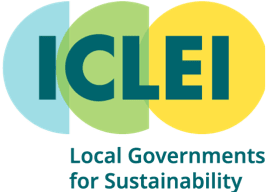Matheus Ortega
Integrated Climate Action Planning
Cities are at the forefront of the climate crisis. In this course, you will learn how cities can tackle climate change and build a more sustainable and just future. Explore how to develop a science-based climate action plan, inspired by the experiences and best practices of cities around the world.
Click to enroll in: English | Spanish | French | Portuguese | Bahasa Indonesia | Mandarin
The planet is at a tipping point. We are facing an unprecedented disaster of global scale: climate change. To protect the lives and livelihoods of billions of urban dwellers, cities must adapt and build resilience to the impacts of climate change, as well as mitigate its causes.
Cities consume over two-thirds of the world’s energy and account for more than 70% of global CO₂ emissions. Also, the increased frequency and severity of extreme weather events are causing significant damage to urban infrastructure, economic activities, natural ecosystems, and most importantly to people, especially the most vulnerable.
Yet just as cities are part of the problem, they are integral to its solution. Many cities are leading the way in finding solutions for the sake of the more than 4 billion urban dwellers spread across the world. From Buenos Aires to Freetown, cities are planning to adapt to climate risks and reduce the emissions that are causing the climate breakdown.
Featuring original video interviews with 20 climate experts and city officials and over 70 case studies from Global South cities, this course offers an unparalleled learning experience to help build a more sustainable and just urban future for all.
LEARNING OBJECTIVES
This course aims to provide an inspirational roadmap for cities seeking to develop or update their work on integrated climate action planning
Climate CrisisLearn about the scientific evidence of the climate crisis, what are its causes and impacts, and how it is affecting people all around the world, especially the most vulnerable. |
Role of CitiesUnderstand the key role cities play in addressing the climate crisis and building a green and just future. Be inspired through case studies from cities around the world, especially in Africa, Asia and Latin America, where more than 90% of the projected global urban growth by 2050 will take place. |
Integrated PlanningLearn how to integrate climate action within cross-departmental planning and development strategies, applying inclusive and equitable principles in climate action planning and practice. |
Climate ActionUnderstand what are the building blocks needed to make a city more ambitious on climate action and develop a science-based integrated climate action plan. |
- Duration
-
8 hours
- Languages
-
English, French, Spanish, Portuguese, Indonesian Bahasa and Mandarin Chinese
Course Outline
Section 1: WHY do we need climate action now?1.1 Climate Crisis: Defining the global climate crisis and its local impacts and explaining the urgency of why we need to act now 1.2 Leadership of Cities: Why cities at the forefront of tackling the climate crisis 1.3 Integrated Climate Action Planning: Why integrated climate action planning is essential to build sustainable and just cities |
Section 2: WHAT are the key elements of integrated climate action planning?2.1 Strategic Appraisal: Where to start planning for climate action 2.2 Inclusive Climate Action: Why climate change and inequality should be tackled jointly 2.3 Climate Mitigation: How a city can measure its own emissions and mitigate climate change 2.4 Climate Adaptation: How a city can assess its climate risks and adapt to climate change |
Section 3: HOW do we move from integrated planning to climate action?3.1 Setting Targets: How to set ambitious yet realistic science-based targets 3.2 Prioritizing Actions: How to prioritize actions that will be impactful, beneficial and feasible 3.3 Financing Climate Action: How to embed a climate lens in local projects 3.4 Tracking Progress: How to measure and assess the progress of targets and actions |
Section 4: WHO should be involved in a city’s climate planning?4.1 Climate Governance: How to establish vertical and horizontal integration and effective climate governance 4.2 Committing to Climate Action: Top tips for cities looking to plan for climate action |
Course Collaborators
CONTRIBUTORS
- Andrea Fernández, Managing Director, C40 Cities
- Annabel Rice, Manager of Climate Budgeting, C40 Cities
- Aris Moro, Senior Manager Cities Finance Facility, C40 Cities
- Catrin Robertsen, Head of Climate Budgeting, C40 Cities
- Chantal Oudkerk, former Head of Adaptation Planning, C40 Cities
- Conrad Crees, UrbanShift Project Officer, C40 Cities
- Emily White, Manager City-Business Engagement, C40 Cities
- Ines Lockhart, Senior Manager, Climate Action Planning, C40 Cities
- Krisztina Campbell, Technical Assistance Manager ICA, C40 Cities
- Marta Stencel, Global Leadership Manager ICA, C40 Cities
- Max Jamieson, former Head of Climate Action Planning, C40 Cities
- Rodolphe Quinn, Climate Change Mitigation Officer, C40 Cities
- Ryan Green, Senior Technical Manager, C40 Cities
- Siyasanga Sauka, Head of Adaptation Planning, C40 Cities
- Stephen Davis, Senior Technical Manager, C40 Cities
- Laura Parry, Senior Manager, CDP
- Bhaskar Padigala, former Manager Energy & Climate, ICLEI
- Samantha McCraine, Technical Coordinator, SBTN
- Augustin Maria, Senior Urban Specialist, World Bank
- Isabel Margarita Cantada, Young Professional, World Bank
- Beth Olberding, former Project Manager, WRI
- Mariana Orloff, UrbanShift Senior Manager, WRI
- Michael Doust, Director Urban Efficiency and Climate, WRI
- Nathalie Badaoui, Senior Manager Integrated Climate Action, WRI
- Robin King, Director of Knowledge, WRI
- Terra Virsilas, Urban Development Associate, WRI
- Tabarre Curras, Global Technical Lead, WWF













